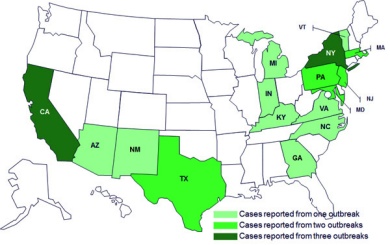The Centers for Disease Control (CDC) is reporting three multistate outbreaks of Salmonella infections linked to small turtles.
A total of 66 people have been infected with outbreak strains of Salmonella Sandiego, Salmonella Poona, and Salmonella Pomona in these states:
- Arizona (2)
- California (8)
- Georgia (1)
- Indiana (1)
- Kentucky (1)
- Massachusetts (3)
- Maryland (6)
- Michigan (1)
- North Carolina (1)
- New Jersey (6)
- New Mexico (3)
- New York (21)
- Pennsylvania (7)
- Texas (3)
- Virginia (1)
- Vermont (1)

So far, eleven people have been hospitalized, but no one has died. And 55% of the victims are children 10 years of age or younger.
These outbreaks are overlapping. The PulseNet system is being used to identify the cases that may be part of these outbreaks. Pulsed-field gel electrophoresis (PFGE) identifies the bacteria’s DNA fingerprint.
The government recommends that small turtles, less than 4 inches in size, should not be purchased or given as gifts, especially to small children. In fact, the FDA has banned the sale and distribution of small turtles since 1975.
Reptiles and amphibians can carry Salmonella and still appear healthy. The bacteria are shed in their droppings and can contaminate the animals and their tanks or aquariums.
When young children handle turtles, kiss them, or put their fingers in the tank and then into their mouths, they can easily contract an infection. Sometimes the tanks are cleaned in the kitchen sink, resulting in cross-contamination during food preparation.
Symptoms of Salmonella poisoning include nausea, vomiting, stomach cramps, and diarrhea. For children, the elderly, and those with compromised immune systems, the infection can lead to serious or fatal complications. If you think you have a Salmonella infection, see your doctor and contact your local health department.




